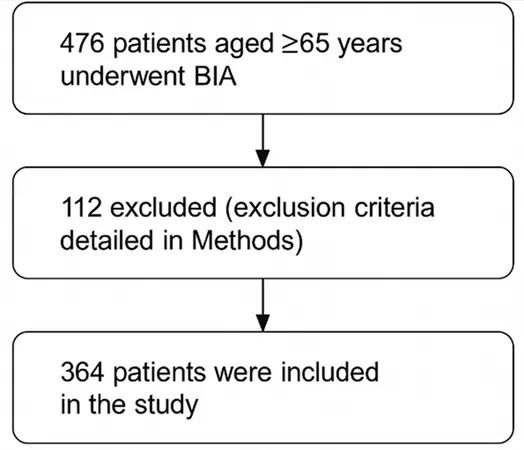
Revolutionary Exercise Program Transforms Colon Cancer Survival Rates
2025-06-06
Author: Wei Ling
Groundbreaking Study Unveils Life-Saving Benefits of Exercise for Colon Cancer Patients
In a remarkable breakthrough, a 3-year structured exercise program has been shown to significantly enhance survival outcomes and quality of life for patients battling stage III or high-risk stage II colon cancer. This finding was presented at the prestigious 2025 American Society of Clinical Oncology (ASCO) annual meeting and subsequently published in the New England Journal of Medicine.
The Canadian Cancer Trials Group (CCTG) initiated the randomized phase 3 CO.21 Colon Health and Lifelong Exercise Change (CHALLENGE) trial to explore the effects of exercise on cancer outcomes, bridging a gap left by earlier observational studies. Remarkably, this is the first-ever trial aimed specifically at assessing whether exercise can truly improve cancer survival rates.
What the Study Entailed
Led by Dr. Christopher Booth of Queen's University, the study included 889 patients across 55 sites in 6 countries. Patients who had undergone adjuvant therapy were split into two groups: one engaged in a structured exercise program (445 participants), while the other received only health education materials (444 participants) over the ensuing three years.
The structured exercise program (SEP) was tailored to encourage participants to boost their recreational physical activity by at least 10 metabolic equivalent hours weekly within the first six months. Patients had the freedom to choose their preferred types of exercise, whether it be swimming, biking, or simply taking brisk walks.
Astounding Results in Survival and Well-Being
Fast forward to a median follow-up period of 7.9 years, SEP participants exhibited impressive outcomes: a five-year disease-free survival rate of 80.3% compared to 73.9% for the health education group. Moreover, eight-year overall survival soared to 90.3% in the exercise group, starkly outpacing the 83.2% in the control group.
The benefits didn't stop at survival; participants in the SEP also reported significantly better physical function, as measured by the 36-Item Short Form survey, over the course of the study. Objective fitness assessments, including maximum oxygen consumption and walking endurance, also showed notable improvements.
Setting New Standards in Cancer Treatment
Dr. Booth emphasized the importance of systemic changes in healthcare, advocating for health systems and providers to create support programs that empower patients to engage in regular exercise post-treatment. He categorized this intervention as a revolutionary form of cancer therapy that is both affordable and sustainable.
"The implications of the CHALLENGE trial extend beyond colon cancer; they suggest that exercise can play a pivotal role in cancer treatment protocols across the board," Booth stated. "Exercise should be recognized not merely as a means of enhancing quality of life but as a viable strategy for improving survival rates. It’s time to integrate this into cancer care for all patients." The results stand as a clarion call to the medical community—it's time to embrace exercise as an integral part of cancer recovery!



 Brasil (PT)
Brasil (PT)
 Canada (EN)
Canada (EN)
 Chile (ES)
Chile (ES)
 Česko (CS)
Česko (CS)
 대한민국 (KO)
대한민국 (KO)
 España (ES)
España (ES)
 France (FR)
France (FR)
 Hong Kong (EN)
Hong Kong (EN)
 Italia (IT)
Italia (IT)
 日本 (JA)
日本 (JA)
 Magyarország (HU)
Magyarország (HU)
 Norge (NO)
Norge (NO)
 Polska (PL)
Polska (PL)
 Schweiz (DE)
Schweiz (DE)
 Singapore (EN)
Singapore (EN)
 Sverige (SV)
Sverige (SV)
 Suomi (FI)
Suomi (FI)
 Türkiye (TR)
Türkiye (TR)
 الإمارات العربية المتحدة (AR)
الإمارات العربية المتحدة (AR)